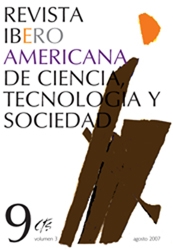Interdisciplinarity
Knowledge Construction in an International Project on Climate Variability and Agriculture
DOI:
https://doi.org/10.52712/issn.1850-0013-930Keywords:
interdisciplinary teams, interdisciplinary knowledge productionAbstract
The growing need to address complex environmentally and socially relevant problems has led to a renewed focus on interdisciplinary teams as producers of knowledge. This paper reports results from a case study of this emerging model for organizing scientific and technological research. Preliminary findings explore the factors that foster or impede interdisciplinary knowledge production, including the participation of stakeholders. The case study focuses on a multi-disciplinary, multi-institutional, multi-national research team convened to understand and model adaptive management of agricultural ecosystems in the Pampas of central-eastern Argentina in response to climate variability and other sources of risk and uncertainty. The team tended to show two kinds of structures which can prevail at different moments: (a) researchers that formed highlyproductive teams with frequent and intensive interactions, and (b) individual researchers or units that organized themselves around the project coordinator. This dual structure – which may have responded to a tight project schedule- may have contributed to reducing team integration and effectiveness.
Downloads
References
BANÚS, E. M. (2006): “La estrategia de redes de conocimiento adoptada por UNESCO”, en M. Albornoz y C. Alfaraz (eds.): Redes de conocimiento. Construcción, dinámica y gestión, Buenos Aires, RICYT/UNESCO.
BOIX MANSILLA, V. y GARDNER, H. (2006): Assessing Interdisciplinary Work at the Frontier. An empirical exploration of ‘symptoms of quality’. Disponible en: http://www.interdisciplines.org/interdisciplinarity/papers/6
FUNTOWICZ, S. y RAVETZ, J. (1992): “Three types of risk assessment and the emergence of post normal science”, en Sheldom Krimsky y David Golding (eds.): Social Theories of Risk, Londres, Praeger.
FUNTOWICZ, S. y RAVETZ, J. (1993): Epistemología política. Ciencia con la gente, Buenos Aires, CEAL.
HANNEMAN, R. y RIDDLE, M. (2005): Introduction to social network method Riverside, CA, University of California. Disponible en http://faculty.ucr.edu/~hanneman/.
HIDALGO, C. (2006): “Reflexividades”: Cuadernos de Antropología Social 23.
LUNA, M. y VELASCO, J. (2006): “Redes de conocimiento: principios de coordinación y mecanismos de integración” en M. Albornoz y C. Alfaraz (eds.): Redes de conocimiento. Construcción, dinámica y gestión, Buenos Aires, RICYT/UNESCO.
NATENZON, C. y FUNTOWICZ, S. (2003): “Ciencia, gobierno y participación ciudadana”, en J. A. López Cerezo (ed.): La democratización de la ciencia y la tecnología, San Sebastián, EREIN.
NISANNI, M. (1997): “Ten Cheers for Interdisciplinarity: The Case for Interdisciplinary Knowledge and Research”, The Social Science Journal, Volume 34, Number 2, pp. 201-216.
POHL, C. (2005): “Transdisciplinary collaboration in environmental research”, Futures 37, pp. 1159-1178.
Downloads
Published
How to Cite
Issue
Section
License
Copyright (c) 2025 CC Attribution 4.0

This work is licensed under a Creative Commons Attribution 4.0 International License.
All CTS's issues and academic articles are under a CC-BY license.
Since 2007, CTS has provided open and free access to all its contents, including the complete archive of its quarterly edition and the different products presented in its electronic platform. This decision is based on the belief that offering free access to published materials helps to build a greater and better exchange of knowledge.
In turn, for the quarterly edition, CTS allows institutional and thematic repositories, as well as personal web pages, to self-archive articles in their post-print or editorial version, immediately after the publication of the final version of each issue and under the condition that a link to the original source will be incorporated into the self-archive.











